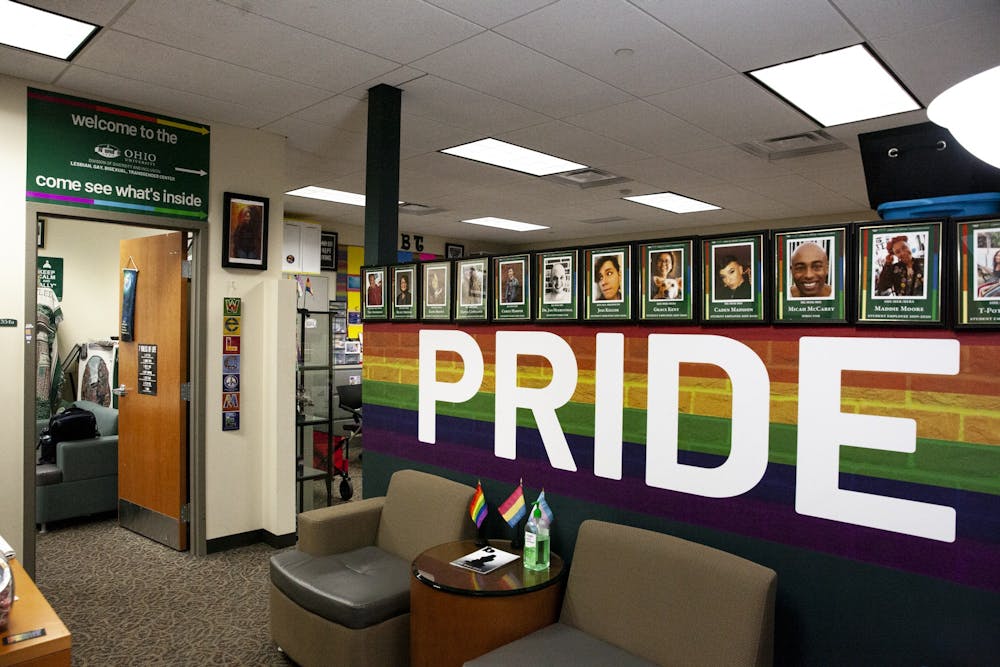Ohio University’s LGBT Center staff is working every day from home to ensure they can still support students during the pandemic.
Though all programs have been halted, the LGBT Center staff is pressing on by hosting virtual programs to keep students involved.
“It’s certainly unexpected. But we are just trying to make lemonade out of the lemons we’ve been handed,“ Jan Huebenthal, assistant director of the OU LGBT Center, said,
Huebenthal and the rest of the LGBT Center staff are certainly not alone in having their spring semester plans halted by the various COVID-19 quarantines throughout OU’s campus and various countries. However, they’re working tirelessly to make sure the LGBT Center’s opportunities and support systems stay alive and well to act as a beacon through a chaotic time.
The first of those programs is making a progress pledge, which is geared toward everyone, not just LGBTQ+ persons. The people who want to make the pledge can go online, fill out a brief survey of how they plan to be an ally to their LGBTQ+ friends, loved ones and to the group as a whole.
“This is going to be like a really strong signal we believe to communicate to students that they are not alone, that there are so many people across our community who support them and who are there for them,” Huebenthal said.
The next program is the Rainbow Resilience Series, which is an initiative to reach out on social media by sharing tips and strategies for how to maintain wellness and sanity during the pandemic. It focuses on mental health, physical activity and an overarching theme of social distancing not equating to social disconnecting.
Virtually, social media seems to be the best way to reach the most people, so the LGBT Center staff will be using their social media to celebrate the LGBTQ+ graduates and acknowledging LGBTQ+ members for days such as Trans Day of Visibility on March 31 and Lesbian Day of Visibility on April 26.
Though the center is doing the best it can to support its students during this time, there have been some sacrifices made to keep people safe and healthy. This includes an event featuring David Collins, a television producer of Netflix’s Queer Eye, as a guest speaker.
However, there’s still several aspects of normalcy within the center, like the SafeZone training programs that will continue to be offered virtually for various groups. This is part of the center’s educational initiative to familiarize audiences with the world of sexual and gender diversity by teaching them to create a “safe zone.”
Huebenthal doesn’t expect everyone to have access to tools like the internet, or even necessities like a comfortable and safe environment. For those people who are in need, Huebenthal recommends phone calls to OU’s Counseling Psychological Services (CPS) and just trying to stay connected with people as much as possible.
“We’re practicing social distancing, but what if we were to reframe that concept from social distancing to distant socializing?” Huebenthal said. “Maintain those connections and reach out to friends and reach out to the LGBT Center. Be connected as much as possible.”
Maddie Moore, a sophomore who works in the LGBT Center, agrees with calling CPS for support. She also believes finding the safest space in whatever environment someone is in is important, and doing some mindful activities like meditation and other self care rituals can help with comfortability levels too.
“(Some people) are not out to their families, they're worried about being disowned financially or actually, physically disowned from their family, and the LGBT Center is the only place they feel comfortable going,” Moore said. “So having those online resources, having people to message and contact when they need help, it's just so wonderful and important.”
Huebenthal believes that people who are living with an LGBTQ+ person should also take it upon themselves to put effort into making the environment as comfortable as possible.
Hayden Spurgeon, a senior who works in the LGBT Center, feels active listening and an open-mind is a great way, but also thinks comfortability can be a good discussion off the bat.
“I would just simply ask that person, ‘what can I do to make you feel most comfortable in this home? How can I respect you?’” Spurgeon said. “Just being open and honest and then most people will be willing to tell you what they want.”
Huebenthal knows making lemonade out of the lemons they’ve been handed is a tough challenge. But at the end of the day, their main focus is making sure every student involved with the center is safe and happy, as well as supported.
“In times of crisis, it's often the most vulnerable who are disproportionately impacted,” Huebenthal said. “And we know that a lot of students who frequent the LGBT Center face different kinds of vulnerabilities — these different kinds of adversity. So I think in the case of the coronavirus. It's really important to kind of remind ourselves of the importance of supporting the LGBTQ community and fending off against other racism and bias.”
For more resources and inquiries, visit ohio.edu/diversity.






